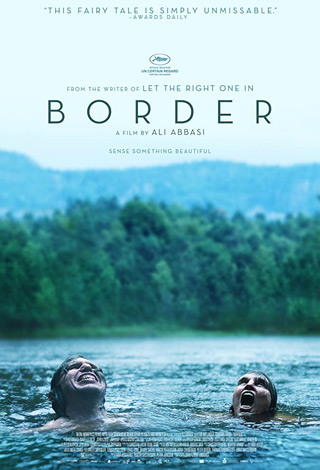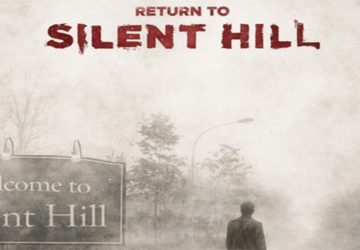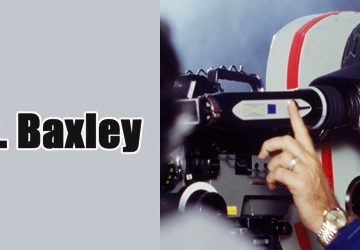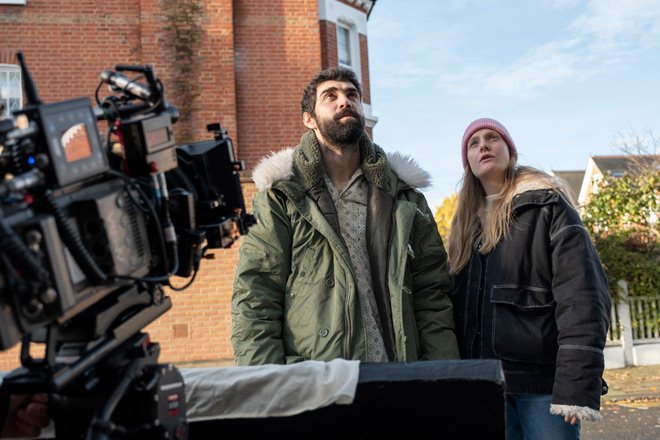
Now, however, it’s time for the exceptionally talented Garai to forge yet another pathway in her career, as a writer-director. Her feature-length debut, Amulet, arrived in select theaters and On Demand on July 24, 2020, thanks to Magnolia Pictures. Shock visuals, demonic possession, and a passion for yesteryear all coalesce inside the film’s grim, savage textures, offering up a moviegoing experience that is apt to jointly confound, intrigue and disgust its audiences. To discuss this bold debut, Garai sat down to delve into finding inspiration in other directors, whether it is appropriate to deem Amulet a ‘feminist film,’ the future, and more.
Cryptic Rock – You have been a successful actress for nearly two decades, but Amulet marks your feature-length debut as a writer-director. How has your time in front of the camera prepared you and educated you for your work behind the camera?
Romola Garai – You just watch a lot of directors working up close. You watch a lot of directors who you love and you desperately want to emulate, and then you work with a lot of directors who you hate and you’re saying, “I’ve got to be able to do it better than that guy!” (Laughs) You get more experience of observing the work of directors than even most people who go and study film at film school. That can give you an over-inflated sense of confidence, but it certainly does give you something—which is a lot of set time as it were.
Cryptic Rock – When you are sitting on a set, are you considering how you can use that experience towards your own material; witnessing everything going on and finding inspiration there?
Romola Garai – Oh yes, absolutely. When you watch really great directors at work it’s a wonderful thing, it’s an art form. It’s a sort of stretched metaphor, but they’re like wonderful parents, aren’t they? They’re good with people, they are good with difficult personalities; they bring everybody together. It’s an incredible thing to be a great director. The people that I’ve seen do it really, really well, it’s incredibly inspiring. There’s now not a day that goes by that I’m not focused entirely on what the director’s doing, how they’re shooting everything, and thinking about that and trying to learn from people.
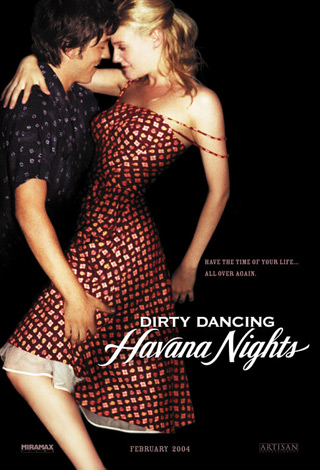

Cryptic Rock – Again, Amulet is a remarkable debut. There’s a love of nostalgia to the film, but it’s a very modern film in its story, shocking visuals and usage of demonic possession. You also take some very big chances with the film. Was it important to you to waste no time in being bold with your first feature?
Romola Garai – I think it’s just the person I am. No one who knows me who has seen the film is surprised at all. (Laughs) There’s a sort of discrepancy with being an actor—I don’t really have a public persona, I was never famous in that way—but people look at your work and think that’s who you are.
When you make a film, particularly with a debut film, the screenplay is just your psychic vomit from the whole time that you’ve been alive. It’s hard to take the edges off that. I certainly didn’t write something that was hugely-crafted. I’ve written a number of other screenplays that have gone through longer development processes and there’s been a lot more involvement. I definitely have other screenplays that are more structured, where there’s more exposition, perhaps more mini-narrative. I’m hesitant to use the word conventional, because that makes it sound bad.
This film, I thought I could try to make a Horror film and I had an idea for a Horror film. People are just so much more receptive to first-time directors and working in a low budget, and all the rest of it, in this genre. The film got optioned at a much earlier stage; it was picked up on my first draft, and then we were shooting the film a year later. So I suppose, in that sense, it’s quite unformed. There’s a lot in it that, certainly now that I’m talking about it, I’m like, “Oh shit, I’m writing about that!” (Laughs)
But that’s not necessarily bad. In the other experiences that I’ve had where you end up having to go through long development processes, you maybe get further and further away from the raw data of what your gut is trying to get out. In a way I sort of feel like it’s been quite nice to make a piece of work that’s based entirely on the shit in your brain that you haven’t really processed.
Cryptic Rock – It is wonderful when you watch a film that you expect it to be one thing, but it becomes something else, and there are so many layers to the story that you could watch it over and over and come away with something different each time.
Romola Garai – I hope that that’s what happens. Maybe people just watch it once and go, “What the hell was that?” (Laughs) But, no, I suppose the intention was always to make something that felt quite slippery. I think I have a real resistance to a lot of the conventions of cinema, because I’ve worked as an actress in it for a really long time. There is a point where you end up with a real hatred of heroes. I just got to a phase where I just really, really wanted to take that status away from the character. So hopefully it bears a second viewing, because everything in the film is geared towards the gradual ridding of his status as the dramatic hero.
Cryptic Rock – Would you consider Amulet to be a feminist film or do you think that might take away from, or scare some people off, all the other layers to the story?
Romola Garai – It’s a tricky one, isn’t it? On the one hand, I’d be happy to call anything feminist. It’s like, “I’m wearing feminist trousers today.” I don’t have a problem with the word; I don’t have a problem with that word being used in any context or anything associated with me. (Laughs)
On the other hand, feminism is not just one thing and lots of people disagree about what it is. So it feels sort of presumptuous to say, well, this is a feminist film. I’m sure there will be a lot of pundits out there who will disagree. Aside from the complex nature of what that word is and what it means to different people, it sort of feels like that’s something more for the audience to decide.
It’s not political. I didn’t sit there thinking how does this film adhere to, not that there are any kind of political rules to feminism anyway—you wouldn’t be able to do that even if you tried. I certainly didn’t sit down to do that, but I don’t have any problem with people using that label because I am a feminist.
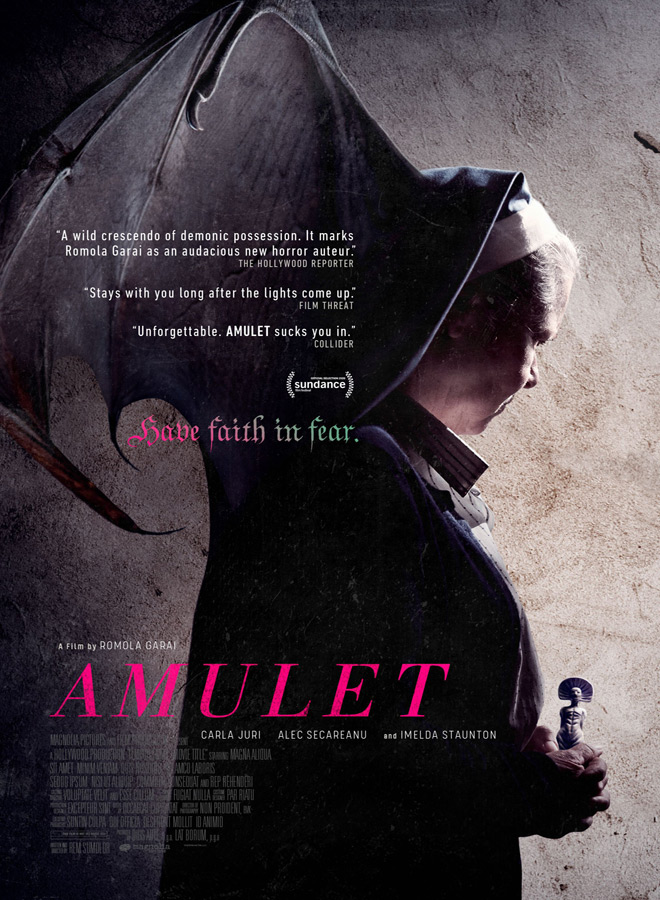
Cryptic Rock – It’s a tricky term because, for some people, calling a film ‘feminist’ is a turn-off and will deter them, and for others it’s quite the opposite.
Romola Garai —-Yes. And of course there are going to be plenty of people who feel differently, or there are the people who will say, “Oh, I really want to see it because it’s a feminist film.” And then they go and see it and they’re like, “But wait—that’s not my kind of feminism.” It’s a term with very different meanings to different people. So, yeah, I don’t know. (Laughs)
Cryptic Rock – (Laughs) Okay, well what’s next for you as a writer and director?
Romola Garai – I’m writing features, I’ve written a pilot for TV—these are all in the early stages. I’m having a few meetings for potentially directing work that I haven’t written, as well. So we’ll see. I’m afraid that’s not a very interesting answer.
There’s certainly nothing imminent. It’s been good to have this period of time to think about how life is short and precious, and if you’re going to take time out to make work, it’s worthwhile to make it what you want it to be—weird and maybe different. So that’s been a creative—it sort of backs you up sometimes when you’re thinking, oh, is this all worthwhile things to do with your time. (Laughs) So hopefully some more weird films, that’s what I’d really like. (Laughs)
Cryptic Rock – It would be fascinating to see you blend something rooted in history with Horror.
Romola Garai – Yeah, like a gothic? I would love that! Sign me up!
Cryptic Rock – (Laughs) Okay, last question. Presumably you are a fan of Horror, are you also a fan of Sci-Fi? What are some of your favorite films in either genre?
Romola Garai – Well, I saw this film a couple of years ago called Border (2018), did you see that? It’s an Ali Abbasi film. Oh my god, that’s amazing! The thing is, it’s not a horror with a capital “H.” It’s about a woman and she finds out at the beginning that she’s actually a troll; it’s like a body horror. That’s one of the best films I have ever seen. I cried so much in the cinema that I basically couldn’t get up at the end. It was amazing, it’s a masterpiece. If anyone hasn’t seen it, they have to go out and rent it tomorrow. It’s an extraordinary film! So I would definitely say that that’s one of the best Horror films that I have seen in the last few years.
Science Fiction, it’s so boring to say 2001: A Space Odyssey (1968), isn’t it? That’s one of my favorite films and I would definitely put that on my Top 10 list.

